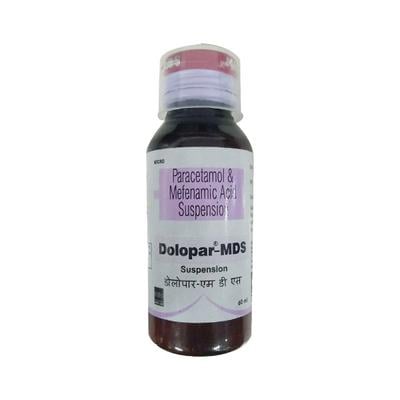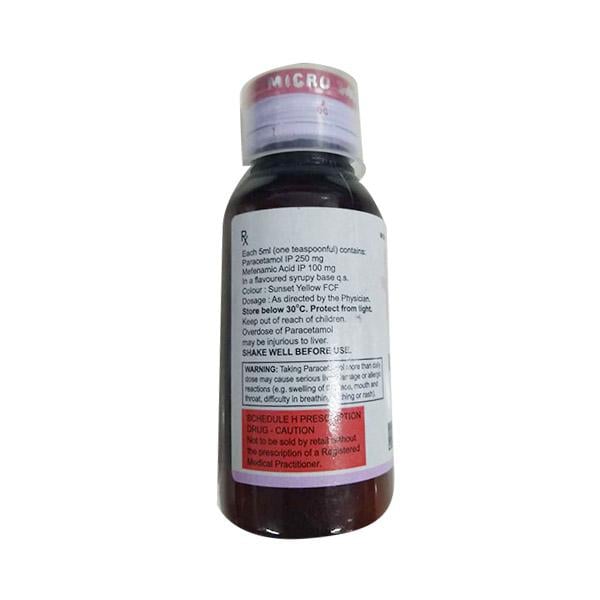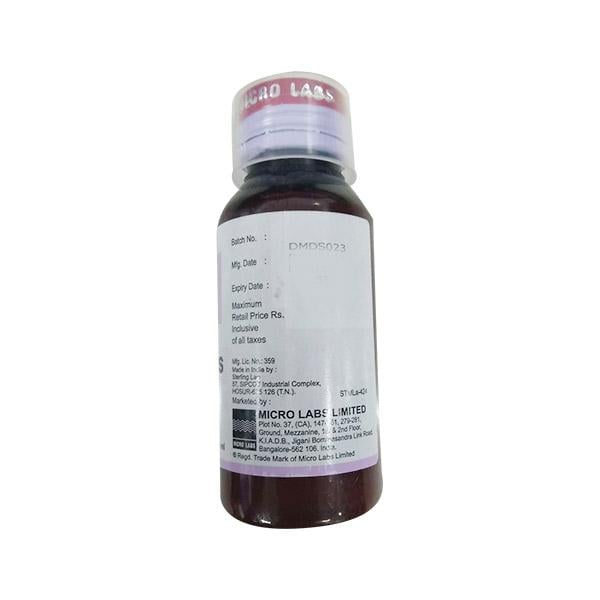

Netmeds First Membership
Quick Links
Introduction About DOLOPAR MDS SUSPENSION
DOLOPAR MDS SUSPENSION is a combination of Mefenamic acid and Paracetamol, which belongs to a group of medicines called Non-steroidal Anti-inflammatory Drugs (NSAIDs) and Analgesics and Antipyretics. It is indicated for the management of fever in children. It is also used for the management of mild to moderate pain such as headache, toothache, joint or muscle pain, and period pain.
DOLOPAR MDS SUSPENSION is not recommended for use in patients with asthma or aspirin-sensitive asthma, severe liver, kidney, or heart disease. Contact your doctor before taking.
DOLOPAR MDS SUSPENSION is generally not recommended for use in pregnant women. Contact your doctor before taking.
DOLOPAR MDS SUSPENSION is generally not recommended for use in breastfeeding women as it may pass through the breast milk. Contact your doctor before taking it.
DOLOPAR MDS SUSPENSION is not recommended for use in children under 6 months of age. Contact your doctor before taking.
DOLOPAR MDS SUSPENSION should be used with caution in elderly patients (aged 65 years or above). Contact your doctor before taking.
The most common side effects of this medicine are skin rash, nausea, vomiting, diarrhea, abdominal pain, constipation, indigestion, flatulence, anorexia, dry mouth, heartburn, peptic ulcers, perforation or GI bleeding, and ulcerative stomatitis. Contact your doctor if any of the side effects worsen.
Uses Of DOLOPAR MDS SUSPENSION
It is used to manage:
- fever
- mild to moderate pain (headache, toothache, joint or muscle pains, and period pains)
How DOLOPAR MDS SUSPENSION Works
DOLOPAR MDS SUSPENSION helps to relieve fever and pain, where paracetamol acts on the hypothalamus (heat regulating center) of the brain, resulting in peripheral vasodilation, sweating, and loss of body heat, and it also increases the pain threshold by inhibiting COX-1 and COX-2 enzymes, and mefenamic acid works by inhibiting COX-1 and COX-2 enzymes, which are involved in prostaglandin synthesis (responsible for pain and inflammation).
How to use DOLOPAR MDS SUSPENSION
Take this medicine as advised by your doctor. Shake well before use. Your doctor will decide the correct dose and duration of therapy for you depending upon your age, body weight, and disease condition.
Side Effects Of DOLOPAR MDS SUSPENSION
Common
- skin rash
- nausea, vomiting
- abdominal pain
- diarrhea
- constipation
- indigestion
- flatulence
- anorexia
- dry mouth
- heartburn
- peptic ulcers
- perforation or GI bleeding
- ulcerative stomatitis
Uncommon
- gastritis
Rare
Stop taking DOLOPAR MDS SUSPENSION and contact your doctor immediately if you experience any of the following side effects:
- allergic reactions such as skin rashes, redness, hives, boils, severe itching, flaking skin, and swelling of the face, lips, tongue, or throat causing sudden wheezing, fluttering, tightness of the chest or collapse, or difficulty breathing or swallowing
- patchy rashes and peeling of skin with blistering of the mouth, eyes, and genitals
- thrombocytopenic purpura
- yellowing of your skin or eyes, pale faeces, and dark urine
- severe pain in the abdomen and back with fever, loss of appetite, nausea, and vomiting
- passing blood in stools or black tarry stools
- vomiting blood or dark particles like coffee ground
- fever, sore throat, and mouth ulcers due to infections
- unusual bruising or bleeding, for example nosebleeds, pinpoint red spots on the skin, and rashes on the skin and mouth
- tiredness, shortness of breath, and paleness of skin caused by anemia
- seizures
- headache, nausea, vomiting, tiredness, muscle cramps (low sodium levels)
- sudden headache, fever, stiff neck, sensitivity to bright light, drowsiness, and muscle pain, with or without a rash
- fever, rash, nausea, aches and pains, passing more or less urine than usual, passing red urine or passing urine at night due to changes in kidneys
- sudden loss of vision or colour vision, blurring of vision, eye pain
- low body temperature, feeling cold with pale-looking skin (in children)
How To Manage Side Effects
Constipation
Eat plenty of fiber-rich foods such as fresh fruits, vegetables, and cereals. Drink plenty of water and exercise more regularly. Consult your doctor if constipation persists.
Diarrhea
Drink lots of fluids, such as water or fruit juices, to keep you hydrated. Do not take any medicine on your own to manage diarrhea. Contact your doctor if the diarrhea does not improve.
Indigestion
Eat smaller meals but take them frequently. Eat and exercise regularly. Contact your doctor if the digestion does not improve.
Nausea And Vomiting
Take this medicine with or just after meals. Stick to simple meals. Avoid eating oily or spicy foods. Consult your doctor if the nausea and vomiting do not improve.
Stomach Pain
Try to rest and relax. Eat small meals but take them frequently. Keep a heating pad on your stomach. Contact your doctor if the stomach pain does not improve.
Warning & Precautions
Pregnancy
ContraindicatedDOLOPAR MDS SUSPENSION is not recommended for use in pregnant women. Contact your doctor before taking.
Breastfeeding
ContraindicatedDOLOPAR MDS SUSPENSION is generally not recommended for use in breastfeeding women as it may pass through the breast milk. Consult your doctor before taking it.
Driving and Using Machines
Use with CautionDo not drive or operate any machines if you feel dizziness, drowsiness, fatigue, and visual disturbances after taking DOLOPAR MDS SUSPENSION.
Alcohol
ContraindicatedAvoid consumption of alcohol while taking DOLOPAR MDS SUSPENSION, as it increases the risk of liver injury and stomach bleeding.
Kidney
ContraindicatedDOLOPAR MDS SUSPENSION is not recommended for use in patients with severe kidney disease. Contact your doctor before taking.
Liver
ContraindicatedDOLOPAR MDS SUSPENSION is not recommended for use in patients with severe liver disease. Contact your doctor before taking.
Allergy
ContraindicatedDo not take DOLOPAR MDS SUSPENSION if you are allergic to mefenamic acid, paracetamol, sucrose, or other NSAIDs such as aspirin, ibuprofen, celecoxib, or any other ingredients of this medicine.
Lungs
ContraindicatedDOLOPAR MDS SUSPENSION is not recommended for use in patients with lung diseases such as asthma, sinusitis with or without nasal polyps (aspirin triad), or aspirin-sensitive asthma. Contact your doctor before taking.
Heart Disease
ContraindicatedDOLOPAR MDS SUSPENSION is not recommended for use in patients with severe heart disease or hypertension. Contact your doctor before taking.
Use In Pediatrics
Consult your doctorDOLOPAR MDS SUSPENSION is not recommended for use in children under 6 months of age. Your doctor will prescribe the right dose depending on your child’s age, body weight, and disease condition. Contact your doctor before taking.
Use In Geriatrics
Use with CautionDOLOPAR MDS SUSPENSION should be used with caution in elderly patients (aged 65 years or above). Contact your doctor before taking.
Others
DOLOPAR MDS SUSPENSION is not recommended for use if you:
- have peptic ulcer, bleeding in the stomach, severe gastritis, active ulceration/bleeding, or chronic inflammation of the upper or lower gastrointestinal (GI) tract
- have inflammatory bowel disease (Ex. ulcerative colitis, Crohn's disease)
- have obstructive uropathy
- had coronary artery bypass graft (CABG) surgery
Before taking DOLOPAR MDS SUSPENSION, inform your doctor if you have:
- hyperthyroidism
- closed-angle glaucoma
- fluid retention or edema
- poor general health
- previous anaphylactic reactions to NSAIDs
- anemia
- intolerance to fructose or other sugars
- bleeding disorder
- major operation
- connective tissue disorder (Ex. Systemic Lupus Erythematous)
- epilepsy
- dehydration
- diabetes
- high cholesterol levels
- smoking history
Interactions
A. Drug-Drug interactions:
Inform your physician if you are taking any of the following medicine:
- cholestyramine (medicines used to decrease high cholesterol levels)
- metoclopramide and domperidone (medicine used to manage nausea and vomiting)
- medicines used to thin the blood (Ex. warfarin, aspirin, clopidogrel)
- medicine used to manage seizures (Ex. phenytoin, phenobarbitone)
- isoniazid (medicines used for tuberculosis)
- medicine used for high blood pressure or heart diseases (captopril, atenolol, ramipril, valsartan, chlorothiazide, chlorthalidone, sotalol, diltiazem)
- ibuprofen, ketoprofen, diclofenac, celecoxib (medicine used to manage pain)
- lithium (medicine used to manage depression and mania)
- medicines used for heartburn or indigestion (Ex. magnesium hydroxide)
- medicine used to manage bacterial infections (Ex. chloramphenicol, aminoglycosides like amikacin, tobramycin, gentamicin, and quinolone antibiotics like ciprofloxacin)
- digoxin (medicine used for heart failure)
- medicines suppress the immune system (Ex. cyclosporine, tacrolimus, methotrexate)
- medicines used to manage diabetes mellitus (Ex. glimepiride, metformin, glipizide, glibenclamide)
- antiplatelet like low-dose aspirin (medicine used to manage platelet aggregation)
- corticosteroids (medicines used to manage arthritis and inflammation)
- mifepristone (medicines used to terminate pregnancy)
- zidovudine (medicine used for HIV infection, AIDS)
- oral contraceptives (medicines used to manage pregnancy)
- medicines used to manage depression (Ex. paroxetine)
- medicines used for anxiety and depression (Ex. amitriptyline)
- barbiturates (used for insomnia)
- probenecid (medicines used to manage gout)
- propantheline (medicines used to manage ulcers)
- narcotic analgesics (medicines sued to manage severe pain)
Overdosage:
If you or anyone else accidentally took too much of this medicine, consult your doctor immediately. Symptoms of overdose are severe stomach pain, coffee ground-like vomit, dark stool, ringing in the ears, change in amount of urine, unusually fast or slow heartbeat, muscle weakness, slow or shallow breathing, confusion, and severe headache.
Synopsis
| Drug | : | Mefenamic acid, Paracetamol |
| Pharmacological Category | : | Non-Steroidal Anti-Inflammatory Drugs, Analgesics, and Antipyretics |
| Therapeutic Indication | : | Fever and Pain |
| Dosage Forms | : | Tablet, Syrup, Suspension, Oral suspension |
More Information
Storage
- Keep out of reach of children
- Store DOLOPAR MDS SUSPENSION below 30°C
FAQs About DOLOPAR MDS SUSPENSION
Q: Does DOLOPAR MDS SUSPENSION cause gastritis?
A: Yes. DOLOPAR MDS SUSPENSION may cause gastritis, bleeding in the stomach or intestine. Contact your doctor before taking.
Q: Does DOLOPAR MDS SUSPENSION cause jaundice?
A: Yes. DOLOPAR MDS SUSPENSION may cause jaundice. Contact your doctor if you experience unusual symptoms such as yellowish discolouration of skin and whites of the eye, dark urine, and pale stools.
Q: Can I use DOLOPAR MDS SUSPENSION in children?
A: Yes. DOLOPAR MDS SUSPENSION is used in children above 6 months of age. Contact your doctor before taking the medicine.
Q: Does DOLOPAR MDS SUSPENSION cause breathlessness?
A: Yes. DOLOPAR MDS SUSPENSION may cause breathlessness. Stop taking DOLOPAR MDS SUSPENSION and consult your doctor immediately if you experience unusual symptoms such as difficulty breathing and chest pain.
Q: Can I drink alcohol while using DOLOPAR MDS SUSPENSION?
A: No. Avoid consumption of alcohol while taking DOLOPAR MDS SUSPENSION, as it increases the risk of liver injury and stomach bleeding.
Q: What is DOLOPAR MDS SUSPENSION used for?
A: DOLOPAR MDS SUSPENSION is indicated for the management of fever in children. It is also used for the management of mild to moderate pain such as headache, toothache, joint or muscle pain, and period pain.
Q: How does DOLOPAR MDS SUSPENSION work?
A: DOLOPAR MDS SUSPENSION helps to relieve fever and pain, where paracetamol acts on the hypothalamus (heat-regulating center) of the brain, resulting in peripheral vasodilation, sweating, and loss of body heat, and it also increases the pain threshold by inhibiting COX-1 and COX-2 enzymes, and mefenamic acid works by inhibiting COX-1 and COX-2 enzymes, which are involved in prostaglandin synthesis (responsible for pain and inflammation).
Q: Who should avoid taking DOLOPAR MDS SUSPENSION?
A: DOLOPAR MDS SUSPENSION is not recommended for use in patients with severe kidney disease, severe liver disease, allergies to Mefenamic acid, Paracetamol, or sucrose, or to other NSAIDs such as aspirin, ibuprofen, celecoxib, lung diseases such as asthma, sinusitis with or without nasal polyps (aspirin triad) or aspirin-sensitive asthma, severe heart disease or hypertension, peptic ulcer, bleeding in the stomach or severe gastritis, active ulceration/bleeding, or chronic inflammation of the upper or lower gastrointestinal (GI) tract, inflammatory bowel disease (Ex. ulcerative colitis, Crohn's disease), obstructive uropathy, or had coronary artery bypass graft (CABG) surgery. Contact your doctor before taking.
Q: What precautions must be taken while using DOLOPAR MDS SUSPENSION?
A: Before taking DOLOPAR MDS SUSPENSION, inform your doctor if you have hyperthyroidism, closed-angle glaucoma, fluid retention or edema, poor general health, previous anaphylactoid reactions to NSAIDs, anemia, intolerance to fructose or other sugars, bleeding disorder, major operation, connective tissue disorder (Ex. Systemic Lupus Erythematous, epilepsy, dehydration, diabetes, high cholesterol levels, smoking history)
Q: Is DOLOPAR MDS SUSPENSION safe for pregnant women?
A: DOLOPAR MDS SUSPENSION is not recommended for use in pregnant women. Contact your doctor before taking.
References
1. Delpharm Bladel BV. Electronic Medicines Compendium (EMC). [Revised in November 2021] [Accessed on 10th August 2024] https://www.medicines.org.uk/emc/files/pil.13316.pdf
2. Rosemont Pharmaceuticals Ltd. Electronic Medicines Compendium (EMC). [Revised in July 2021] [Accessed on 10th August 2024] https://www.medicines.org.uk/emc/files/pil.6693.pdf
3. Mefenamic acid and Paracetamol. Centaur pharma. [Accessed on 10th August 2024] https://www.centaurpharma.com/downloads/peadiatrics/pyrexia/Centamol%20Plus%20Suspension.pdf
4. Mefenamic acid and Paracetamol. Vibcare. [Accessed on 10th August 2024] https://vibcare.co.in/mefenamic-acid-paracetamol/
5. Mefenamic acid and Paracetamol. Bluecross labs. [Accessed on 10th August 2024] https://bluecrosslabs.com/wp-content/uploads/2021/01/MEFTAGESIC-P-SUSP.pdf
Useful Diagnostic Tests
- Complete Blood Count (CBC)/ Hemogram
- Kidney Function Test (KFT)
- Liver Function Test (LFT)
- Serum Electrolytes/ Electrolytes Profile
- Healthy Midlife Checkup
- Men Health Checkup - Advanced
- Complete Women Checkup
- Full Body Checkup - Gold
- Full Body Checkup – Silver










